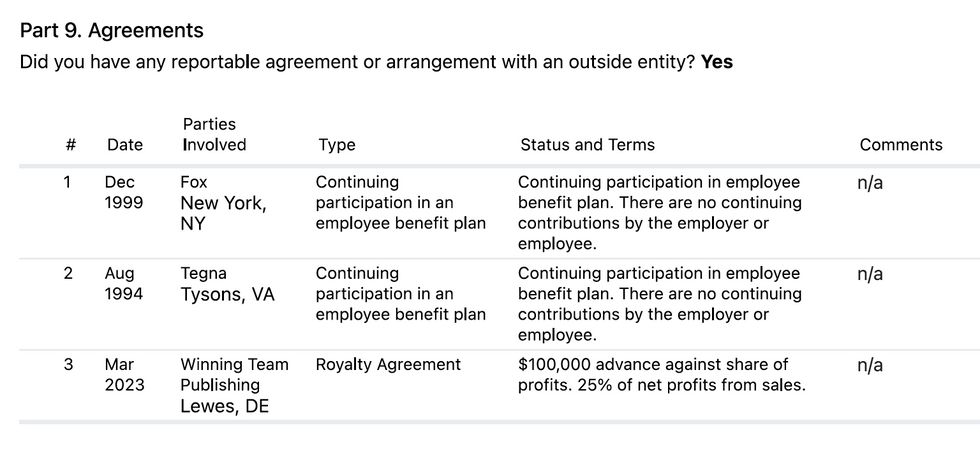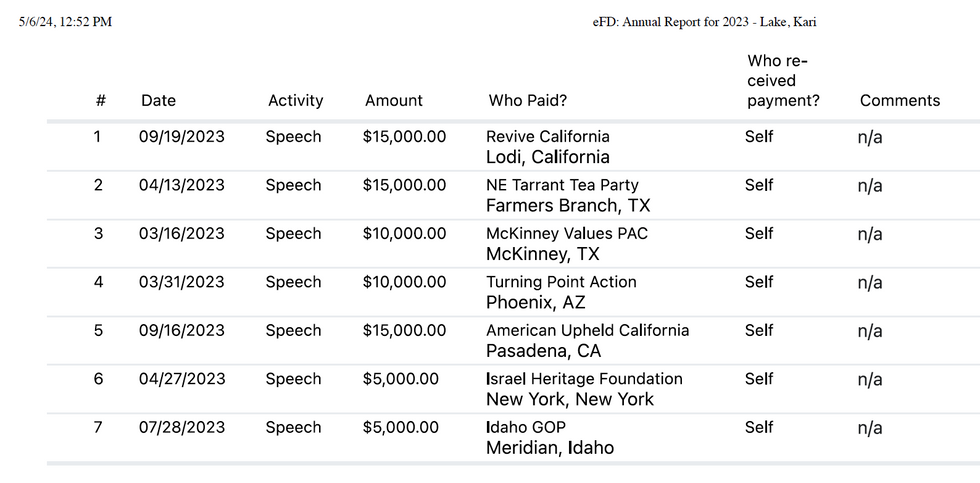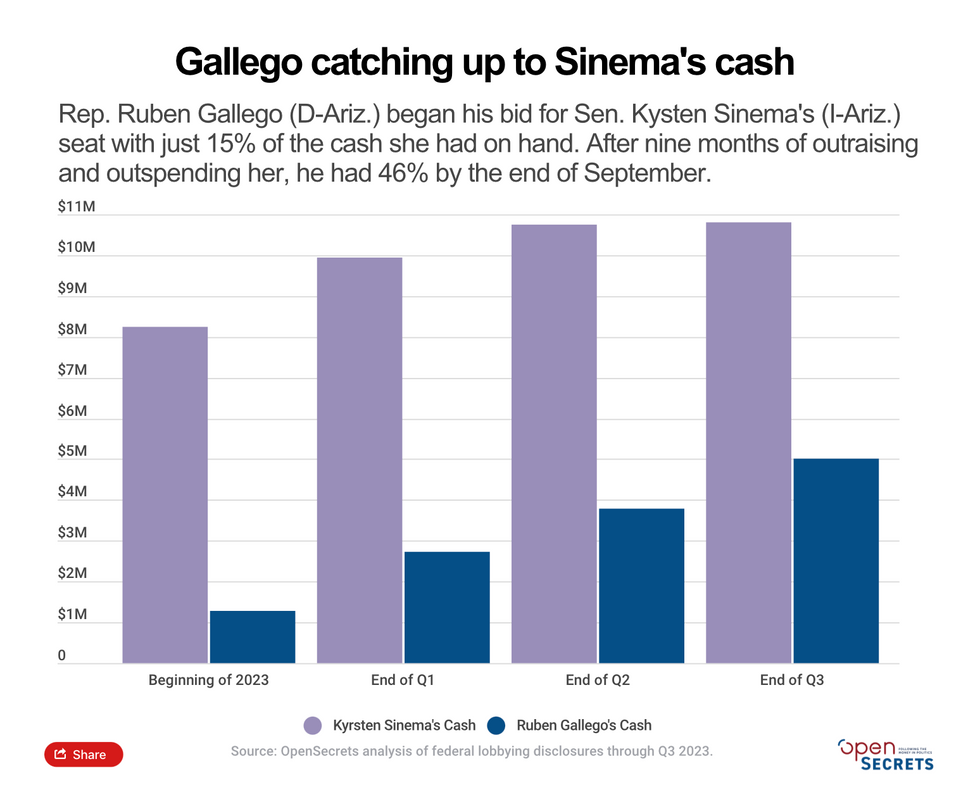The 43-day government shutdown did not produce the outcome that the Democrats said they wanted. In fact, eight of them* caved before getting the president and the Republicans to negotiate on health care.
But the shutdown did demonstrate something important – that the Democrats are no longer the party of “norms and institutions.”
In October, Sen. Ruben Gallego (D-AZ) was asked why his party was using the shutdown to reach a policy goal when the Democrats said in the past that doing so was in violation of “the norms of government.”
The reason, Gallego said, was Donald Trump.
Norms are “out the window.”
“You’re talking about norms in the time of Donald Trump?” Gallego said.
“It’s also not normal to tear down the East Wing … This is a man who’s extorting people. He’s literally breaking every rule. We’re not going to go back and play by the norms … I’m not going to abide by old norms, especially when you’re dealing with this presidency, this administration, and how the Republicans themselves have been acting.”
However, it’s one thing to say you’re not going to abide by old norms. It’s another to make new ones. That’s what some Democrats are doing.
Again, Gallego is representative.
He was asked what he would say to Pete Hegseth after the Defense Secretary threatened to prosecute Sen. Mark Kelly (D-AZ).
“You will never ever be half the man that Sen. Kelly is,” Gallego said.
“You, sir, are a coward. And the fact that you are following this order from the president shows how big of a coward you are. I can't wait until you are no longer the secretary of defense” (my italics).
In the past, no Democrat would have made such a veiled threat. They would have feared the appearance of violating the norm against “weaponizing the federal government” against partisan adversaries.
But here, Gallego suggests a new set of norms:
- There must be consequences for presidential-level crimes.
- The Republicans can’t be trusted to hold their own accountable.
- Only the Democrats can do that. They must be the consequences.
“Donald Trump is gonna be gone in a couple years,” Gallego told CNN last week. “If you're part of the military that is going after sitting members of Congress … there will be consequences without a doubt.”
He even used the word “tribunal.”
“There’s going to be a lot of officers that will be part of this tribunal, if you want to call it that. They’re going to be looking over their shoulders, because they know that Donald Trump will be gone and they will not have that protection. They’re going to have to do the safest thing possible, which is to follow the Constitution.”
The vast scale of corruption we are witnessing, with the blessing of the Republican Party, means the terms and conditions of the old social contract are void and no longer apply. The stakes, meanwhile, are much bigger than one authoritarian president. Everyone pays for the crimes of what some are calling “the Epstein class.” Here’s the Post:
“Today is the first real reckoning for the Epstein class,” Ro Khanna said, before calling the effort to obscure Epstein’s crimes “one of the most … disgusting corruption scandals in our country’s history.” He later told us that being “America first,” parroting the messaging that elevated Trump’s political career, meant “holding the Epstein class accountable” and “lowering costs” to make “people’s lives better.”
All the above is being said in the context of Trump’s growing weakness. Poll after poll show public dissatisfaction with his job performance, even among supporters. (CNN's Henry Enten said that, all things being equal, there is no path to holding the House majority.) The Democrats see a chance to win back power. But what will they do with that power once they get it? Will they return to the old norms or make new ones?
Is this talk of future consequences real or just talk?
For an answer, I turned to Samantha Hancox-Li. She’s an editor and podcast host for Liberal Currents. In a recent essay, she wrote about the biggest problem facing liberals and Democrats, and the reason why they have in the past clung so fiercely to “norms and institutions.”
The fear of power.
“We have built systems that are so good at preventing us from doing anything that they also prevent us from doing good things,” Samantha told me. “And in this time of crisis — housing crisis, climate crisis, among others — we desperately need to do good things and not just prevent anyone from doing anything that might be bad.”
JS: You have said the biggest problem with liberals is our fear of power. That probably comes as a surprise to some. What do you mean?
SH-L: I mean the fear of power exercised badly. For many progressives, we start with an image — maybe a corporation polluting the environment or the government bulldozing a minority neighborhood in the name of urban renewal. And then we conclude that the correct response is to put a shackle on power. We need to make sure that before we do anything it's not going to hurt anyone. Sounds good, right?
But the devil's in the details. What does "make sure" really mean? Does it mean that we need 10 years of studies, of community engagement, of lawsuits and counter-lawsuits, of even more studies, before we can implement congestion pricing in New York City? Does it mean years of process before building 20 units of housing next to a busway? Does it mean that every random NIMBY can sue to stop the construction of solar energy, transmission, battery factories, etc?
In practice, the answer is yes: we have built systems that are so good at preventing us from doing anything that they also prevent us from doing good things. And in this time of crisis — housing crisis, climate crisis, among others — we desperately need to do good things and not just prevent anyone from doing anything that might be bad.
I was trying to think of an example: Merrick Garland. Thoughts?
Absolutely. I've focused on physical objects — on climate and housing — because these are longstanding problems and our self-imposed shackles have prevented us from effectively responding to them.
But it's also clear that when we take power back from Trump II, we're going to need to do some serious housecleaning. Biden came in on the idea that "the fever would break," everything would go "back to normal," that he didn't need to upset the apple cart by prosecuting criminals in high places. Hence, Garland's shocking inaction in response to Trump's J6 attack on the capital — inaction that ultimately enabled Trump's return to power.
But if we're going to do that kind of housecleaning, we can't allow ourselves to get hung up on process. We're going to have to nuke the filibuster. We're going to have to revitalize Congress. And that means expanding the Senate and adding states. We're going to have to do serious court reform. If we allow ourselves to get hung up on norms that Republicans treat as dead letters, we're going to fail. This means that we are going to need to really exercise power — not trip ourselves up with self-imposed process.
I think if we do come back into power, there's going to be a lot of voices calling for a "return" to normalcy, for creating even more process requirements that the next Trump will simply ignore. Look around us — have process requirements stopped Trump II? No.
We need more than just vetocracy.
We need a real revitalization of effective governance in America.
I would put your argument in the norms and institutions category. There's no sense in defending them if they have become corrupt or are too weak to do what needs doing. I found this surprising, from Ruben Gallego. You might have seen this clip. A hopeful sign?
A good sign, absolutely. Gallego is not exactly some radical leftist. He's a relatively moderate Democrat from a purple state, but he rightly recognizes that with Trump II's total assault on our republic and our constitution, we have exited the era of "normal politics."
That to me is the fundamental dividing line in progressive and Democratic politics — not between "moderates" and "progressives," but between those who want to fight and those who are still in denial.
As I wrote recently, "you don't get to decide when you're in a fight." MAGA made that choice. What matters now is how many of us wake up to that fact.
In my experience, the Democratic base knows we're in a fight. The base is raging angry and wants real change, not empty words.
The divide is among elites — in the Democratic Party, in the media, in civic institutions like colleges and law firms. Some want to pretend they can extract this or that policy concession from Trump. Others recognize that Trump wants to be king, that he wants to shred our constitution in favor of a vision of a white man's republic, and that we have to throw out our old ways of thinking and embrace war mindset.
It seems to me the Democrats, if they are going to use power to do good, need to relearn how to talk about it. In an interview with me, Will Bunch drew on language from the liberation movements of the 1960s and 1970s to secure more personal freedoms. Perhaps in a climate of tyranny, the Democrats can appeal to individual liberty?
I think the language of freedom and liberty is the fundamental terrain of American politics. I think a lot of leftists have been very uncomfortable with this for a long time. They don't want to talk about freedom. They don't want to talk about the Constitution. They don't want to wave the red, white and blue. They want to stand on the outside and critique all that. Personally I think these people are addicted to losing. If you want to win power in America, you do it using the language of freedom and the iconography of Americana.
So I think we as liberals need to embrace that imagery. I've seen an explosion of imagery drawing on the Revolutionary War, the Founding Fathers, and especially the Civil War and the long struggle against the slave power. I think this is great, because these are core parts of liberal history! Liberalism has always been a fighting faith. Liberalism has always been a revolution against oppression and tyranny. It's just that in the doldrums of the Long 90s, we allowed ourselves to forget that. But it's time to go back and remember what we're fighting for.
And that means insisting on democracy, insisting on inalienable rights, and insisting on the rule of law. All of these are under attack. Trump is deporting citizens, murdering random fishermen, deploying thugs and masked secret police to our cities. Maga wants a king. We must stop them and deliver on the promise of America for all Americans — a better life, hope for the future, freedom in a diverse country.
About those elites. Many inside the Democratic Party are going to lobby hard against the use of power to do good things, because those good things will help everyone, and anything that helps everyone tends to be bad for elites. What are your suggestions?
First and foremost, we gotta win some primaries. That is the single biggest lever of power we've got to change the internal makeup of the Democratic Party. Earlier, you mentioned Ruben Gallego. He's in that seat because he beat Kyrsten Sinema, a notoriously centrist politician, in a primary. But at the same time, we can't go chasing after every random newcomer who talks a big game about bringing populism to Washington — just look at what happened with John Fetterman. People liked his "sticking it to the man" vibes, and it turns out those were mostly just vibes. In practice, he's been a relatively conservative senator. So we need to actually think about good primary challengers.
Second, I think we need to win the war of ideas. Politicians mostly know politics. When it comes time to implement policy, what they do is go to "the bookshelf." This is the collection of ideas and policies and programs that intellectuals and pundits in their coalition have come up with. Why did Biden pursue a radically more aggressive stimulus than Obama? Because Democratic intellectuals had consolidated around inadequate stimulus as the cause of the Great Recession.
So we need to make sure the bookshelf is well-stuffed with workable plans that Democrats can implement. We need to demonstrate that moderation is a false light — and that a real reforging of the constitutional order is necessary. That means both high church policy and a trench fight of social media, the constant war for attention in the attention economy. The posting-to-policy pipeline is very real.
So there it is.
Win primaries and win the war of ideas.
We gotta do both.
*There were, in fact, nine. Chuck Schumer orchestrated the Senate’s surrender, though he himself voted against reopening the government.



 Kari Lake's second amendment to her financial disclosure report for 2023 includes the terms of her book deal.
Kari Lake's second amendment to her financial disclosure report for 2023 includes the terms of her book deal. Kari Lake's paid speaking appearances in 2023. (Source: U.S. Senate Office of Public Records)
Kari Lake's paid speaking appearances in 2023. (Source: U.S. Senate Office of Public Records) Credit: OpenSecrets
Credit: OpenSecrets